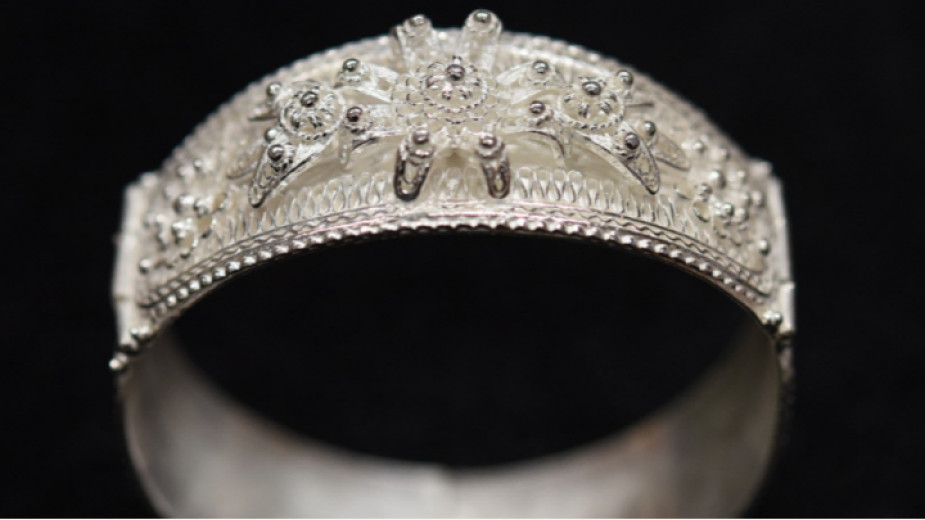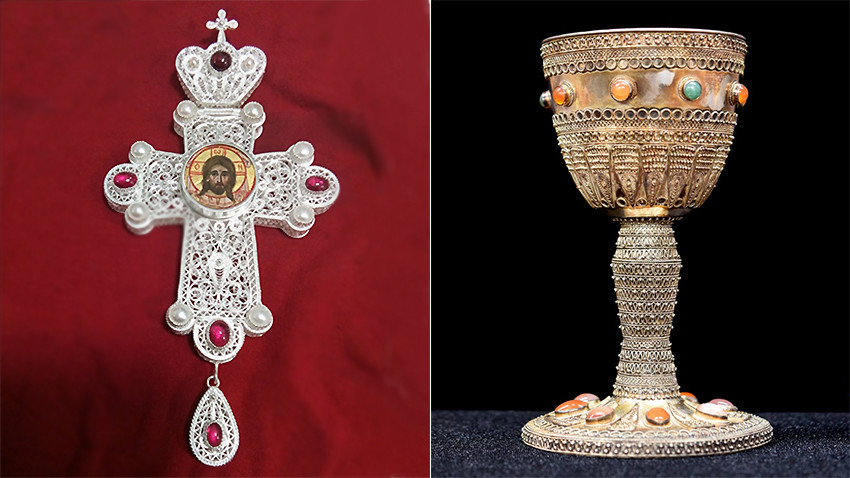 13
13
To become a real master craftsman one needs talent, dedication and a lot of time. Nowadays, when society lives quick and easy life, a series of Bulgarian crafts are about to disappear. There are simply no master craftsmen left. One of these crafts is jewelry making and more specifically the fine technique- filigree. The name itself is derived from the Latin words for thread (filum) and grain (granum), with the latter referring to the tiny beads that were often used in filigree jewelry. One of the most fascinating jewelry-making techniques still in use today, involves twisting thin metal threads into intricate lace-line patterns. The fine wire pieces are then soldered together to create a larger piece. Filigree is used in making jewelry, earrings, necklaces, mugs, trays, belts, frames, etc.

This technique requires a high level of artistic and jewelry-making skills. The entire process is extremely difficult, master jeweler Tsetsa Damyanova from the town of Berkovitsa said for the BNR. In her words, the technique dates back to ancient times and appeared on the territory of present-day Bulgaria around 3,000 BC. In the Middle Ages, filigree was a highly developed craft- master jewelers had a flair for detail. That is why their works were part of the church utensils. Later, citizens wore this type of jewelry as a sign of a social status. Some of the most exquisite and expensive pieces of jewelry in Bulgaria were made of pure silver and gold coating. They are the work of the master jewelers from the Chiprovtsi School. After the National Revival period, they gained popularity across Europe.

“This jewelry-making technique is extremely difficult and takes years of training to reach the necessary level to create a beautiful jewel with its own distinction”, Tsetsa Damyanova said for the BNR.
She herself began practicing this technique more than 60 years ago. She was part of the cooperative “Souvenirs and Jewelry in Berkovitsa” which was established in the 1960’s by Teodor Spassov from the Chiprovtsi School. Today, ten jewelers are members of this cooperative society. However, young people are not showing enough interest in this art.
In fact, Nikola Vaptsarov School in Plovdiv is the only Bulgarian school that offers special training in jewelry-making. For nearly two decades, hundreds of Bulgarian students have had the opportunity to gain knowledge and learn the subtleties of this beautiful craft.

Recently, the alumni studying jewelry-making had the unique opportunity to study filigree thanks to the assistance of the few remaining master jewelers Stefan Stefchev, Albena Stefcheva and Tsetsa Damyanova.

“I was very happy to learn that a class in Plovdiv offers training in jewelry making under the project. This is great. These are young people who show interest in filigree and give this technique a modern look. Their works are very beautiful. That is why we must support these children”, Tsveta Damyanova said.
The master jewelers were impressed by the enthusiasm and diligence of the young people who used the filigree technique to make earrings and silver pendants.
If you are also interested in ancient Bulgarian crafts, you can visit the traditional Crafts Week in Plovdiv. This year it will be held between June 27 and July 3 at the Regional Ethnographic Museum in Bulgaria’s second biggest city.

Compiled by: Vesela Krasteva (interview by Lili Goleminova, BNR-Radio Sofia)
English version: Kostadin Atanasov
Photos: filigree.bg, Facebook / @Filigree.bg, ruralbalkans.comVFU (Visionary Font Ultra) – this is the name a third-year student from Varna Free University, Volodymyr Fedotov, has given to the font he is presenting at the International Triennial of Typography in Poland. “To create a font takes a sense of..
On the 143 rd birth anniversary of foremost Bulgarian painter Vladimir Dimitrov-the Master, an award ceremony will take place at the art gallery in the town of Kyustendil, at which the national prize for painting for 2024 will be awarded...
The new Bulgarian film "Don't Close Your Eyes", which premieres in cinemas across the country on January 31, explores the miracles of life and the ability to follow our path without losing faith. In a nutshell, the story revolves around a priest,..
On the 143 rd birth anniversary of foremost Bulgarian painter Vladimir Dimitrov-the Master, an award ceremony will take place at the art gallery in the..
VFU (Visionary Font Ultra) – this is the name a third-year student from Varna Free University, Volodymyr Fedotov, has given to the font he is..

+359 2 9336 661
